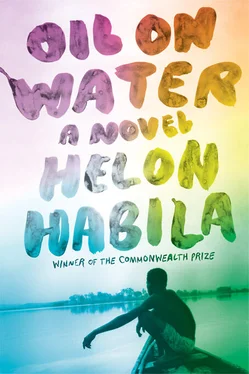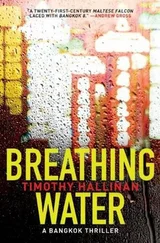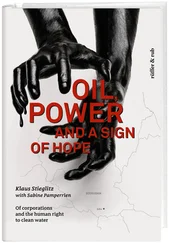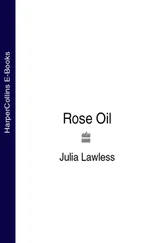Escaping the camp was easier than I had expected. I put on the white robe Naman gave me and kept my head low. I entered the woods and went toward the cemetery, all the while keeping half an eye on the soldiers, but none of them seemed interested in me. Only later did I discover the reason for this lack of attention: there was simply no means of leaving the island by boat, even if one escaped the camp. The boats had been systematically riddled with bullet holes by the soldiers, and the narrow, dugout canoes had been chopped to bits and were being used as firewood. I did as Naman instructed, and once I left the cemetery I headed north, making for the water. I swam away from the shore, and then took a deep breath and dived. Naman said that all I had to do was let myself be carried by the water and I’d end up near the pier where the fishermen kept their canoes, and once in a canoe, I wouldn’t take long to get to Tamuno’s village and there Chief Ibiram would help me get to Port Harcourt.
But as I dived and touched bottom, everything went dark. I lost consciousness. When I opened my eyes I was on the shore, my legs in the water and my head in the sand, and above me the sun was harsh, burning into my face. I stood up, looking around, trying to determine where I was and how long I had been unconscious. I dragged myself to the line of trees. To my left I could see the fencing around the cemetery, so I had really not gone very far at all in the water. The pier was still way off, about a kilometer away. I decided to walk through the trees, keeping the water in view till I got to the pier. I was so hungry and weak that I fell down after taking only a few steps. I hoped I was not coming down with the same fever as Zaq, but I didn’t want to think about it. I forced myself up and resumed walking, sitting down sometimes for over thirty minutes to rest my wobbly legs, and as I got nearer to the pier, I kept my eyes open for the canoes, and for the soldiers who might be out there patrolling, looking for stray villagers or invading militants.
Much later, driven by hunger, I came out of the woods and headed for the village center, ducking behind a tree whenever I heard a noise. I passed houses with wide-open doors through which I could see the empty compounds. Some of the houses had broken walls and roofs, with smoke still issuing from the rafters, yet some were surprisingly untouched. At Gloria’s tenement I found the front door was kicked in, and it now lay beside the doorway, its zinc sheet twisted and torn. I went in slowly, staying close to the walls. The central space in the compound was littered with all sorts of objects abandoned by their fleeing owners: a lady’s shoe, a magazine, a shattered earthenware pot by the kitchen door. The door to Gloria’s room was open, and I entered. I looked at the broken pieces from a mirror on the floor, and the open wardrobe, and the cracked window, and I imagined her being dragged out by the men as she cried and begged to be spared. I sat on the bed where we had once made love. Over there was the seat where she had entertained me with a bowl of jollof rice. At the thought of food my stomach rumbled, my knees felt weak and I knew that I might have to return to the shrine and admit to Zaq that I had failed. But first I needed rest. I lay back and closed my eyes; when I opened them again it was dark. I was sweating and shaking, my mouth was dry and I could feel the heat rising off my skin. I was definitely coming down with something. I curled up in the bed, watching the compound through the open door. I was too weak to care anymore if I was discovered by the soldiers.
Outside the sun is bright. I am talking to Zaq in the hut; it is oneof those days when he looks spry and full of energy.
— Did you really love Anita? Can you continue to love a person regardless of such shortcomings? Maybe because you hope to save them? Or because you can’t help it? Isn’t that what love is all about?
Zaq says nothing. He turns his face away, but just before he does so, I see the pain, the bitterness on that face. The sadness seems so out of keeping with the beautiful day outside, and I feel sorry I introduced a sad note into such a glorious day, but I want to hear his answer desperately, for some reason. He speaks softly, sadly.
— What’s the point? It is all memory now.
Anita died in a detention center in London. She hanged herself in the bathroom. The news didn’t make the front pages of the Lagos papers, just a single column in the back of one or two provincials.
Voices. Whispers. Soldiers, perhaps.Then the cry of a child, and I thought I was imagining it. I got off the bed and crawled on all fours to the door. It was dark, the voices were coming from one of the many broken-down doors on either my right or my left. I waited, controlling my breathing, and suddenly I saw a flicker of light, and then it disappeared. Not soldiers — they would be more brash and noisy than this. I stood up and moved toward the room, but just as I got to the door my leg kicked against an empty tin, which elicited a brief scurrying sound from the room. Then silence.
— Hello.
Silence.
— Is anyone there? I’m a friend. I know you can hear me.
My voice shook, my legs were bowed and I had to hold on to the doorframe with both hands to remain upright.
— I’m a friend. I’m coming in. Here I come.
It was a moonless night and the room was nothing but vague outlines and humps. I held my breath and waited, and after a while I heard breathing, movement. I braced myself, half expecting something to whizz out of the darkness and connect with my face, but instead a match was struck and a face emerged behind the glow. A candle was lit. It was a man, in the corner, crouched on the floor. He raised the light, moving his face sideways, trying to see my face. I stepped in, and in the corners still cloaked in shadow I could hear other figures moving about, staring at me.
— My name is Rufus. I’m alone.
I spoke without thinking, trying to give as much reassuring information as possible. I couldn’t see his face: he shaded the candle with his hand so that the light fell only in my direction.
— I’m a reporter.
— A reporter?
It seemed the man turned to look into the dark part of the room, as if to communicate his surprise to the others in the shadows.
— Yes. I’m a reporter from Port Harcourt.
— What are you doing here by yourself?
Now I knew he wasn’t dangerous.
— Listen, do you have anything I can eat? I’m very hungry.
He got up and disappeared behind the light, then I heard whispering, a woman’s voice, low. He came back with something in his hand and handed it to me. It was meat, dried, rubbery, gamy. I sat down on the floor and ate, all the while staring into his glowing, watchful eyes, and when I finished he gave me a cup of water that I drank in a single gulp. He seemed to want to get rid of me as quickly as possible, but I wasn’t ready to leave him just yet, I was curious to see who was with him, and I had questions that needed to be answered, like where to find a boat.
— I escaped from the fighting. Who are you?
A figure rose from the corner and entered the light, and I saw a woman in a boubou and wrapper, a head-tie covering most of her face. More figures came forward. It was a whole family: father, mother and three children. The youngest, who looked to be about three, was crying, her face running with tears and snot, blotchy from insect bites and grime. The mother and children had been huddled beneath a large blanket, and now the children peered at me from outside the light’s circumference, and their expressions told me they felt more pity for me than fear. They had been here a whole day now. They had locked themselves up in the toilet when the shooting began, and afterward they had moved to this tiny room, coming out only to go to the toilet or to look for food. The husband was a tall, distracted-looking fisherman and he jumped at the slightest noise, clearly scared witless for his children’s safety. I wondered if there were similar families in the other houses, huddled beneath blankets, stifling their children’s cries, waiting for the storm to blow away. Revived by the water and dried meat, I stood up.
Читать дальше












